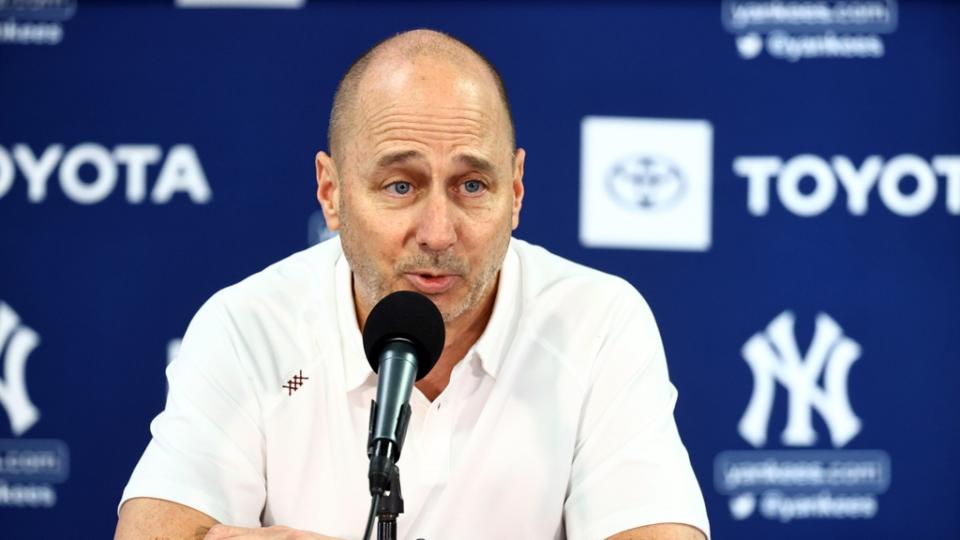
Brian Cashman received a text message on Friday from one of the Yankees staffers who handle contracts informing him that he had become an at-will employee. Cashman’s contract as general manager had expired on Monday, so his employment status had changed.
Cashman’s ID badge still works, his benefits remain active and he expects to receive a paycheck next Friday.
Still, according to sources, while Hal Steinbrenner and Cashman have spoken in general terms about the future of the franchise — conversations that imply Cashman will be a part of it — Steinbrenner has not yet made Cashman an initial contract offer. Therefore, the Yankees do not currently have a GM under contract. Technically.
More than likely, Cashman’s at-will status will prove temporary, and a new contract is forthcoming. For context, he did not agree to his previous five-year contract until Dec. 11, 2017. While some of Cashman’s friends in the organization wondered last week if he would choose to stay, there is a sense around him now that he will.
“I think it gets done,” one close associate of Cashman’s said on Friday afternoon.
For that to happen, Cashman and Steinbrenner have to agree on money and terms, topics that they have not even begun to discuss.
Why, you might ask, would the Yankees allow Cashman to speak to the media and fans on Friday as the face of the front office without a contract or even an offer? And then travel next week to the GM Meetings in Las Vegas?
The answer lurks just underneath the surface: Even if Cashman and the Yankees do part — and again, this does not feel likely — they would do so amicably. Cashman has worked for the Yankees since 1986, and feels a strong loyalty to the Steinbrenner family.
In turn, the Steinbrenners are said to trust Cashman and believe in the organizational infrastructure that he has put in place (efforts to reach Hal Steinbrenner on Friday were unsuccessful).
Under Steinbrenner, the Yankees are a dynamic, evolving organism, pivoting at various points in the past few years to emphasize on analytics, defense, athleticism, contact hitters, and whatever else they learn is necessary to keep pace with the modern game.
Fan speculation about the GM’s job status after this month’s American League Championship loss to Houston perhaps didn’t account for what would happen next if Steinbrenner or Cashman did decide to move on. It’s not like ownership would consider pivoting immediately to a different kind of leader, like when the Phillies brought in Dave Dombrowski. In that situation, the previous GM, Matt Klentak, had failed. Clearly, Cashman has not.
The Yankees have spent too much time and money overhauling departments like player development, pro scouting, analytics and strength and conditioning to want to change everything again — and that’s what any new head of baseball would want to do.
If Cashman left, he would more than likely recommend internal or external replacements to oversee the current systems. No one believes that Steinbrenner is looking to blow up the team’s entire process after 30 consecutive winning seasons, 25 with Cashman as GM.
Steinbrenner’s own nephew, Stephen Swindal Jr.works in player development and is seen as an up-and-comer (he is the son of Yankees general partner Jennifer Steinbrenner Swindal), plugged into the analytics and new processes. That alone stands as a piece of evidence for how connected the family is to the systems currently in place.
When we zoom out to see the organization as a whole in this way, it becomes clearer why the Yankees are not talking about broad change. The organization is highly frustrated by the lack of World Series appearances since 2009, but does not see how one winning season after another is reason to abandon the model.
As for Cashman himself, he won’t leave in a huff or be fired on a Steinbrennerian impulse. There is too much mutual respect — even love — there. George Steinbrenner was a challenging boss, but Cashman knows that he was the reason for the lucrative career he has enjoyed.
He also knows that his own late father, a Steinbrenner associate from the harness racing world, took great pride in his stewardship of the Yankees. All Yankees employees view Hal Steinbrenner as eminently more reasonable than his father.
These ties, and feelings, run very deep. Whenever Cashman wraps up his time here — and it doesn’t look like that will happen this year — it will be a different type of parting than we usually see in baseball, because of the depth of the mark he has made on the franchise, and the authenticity of his collaboration with the owner.